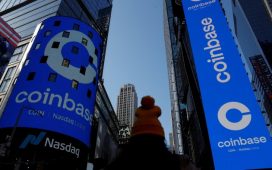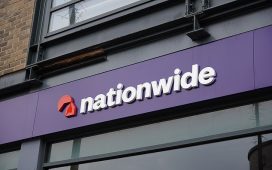- Kantar said grocery prices increased 2% in September
Shoppers took the record wet weather in September as a sign to stock up on hot chocolate, soup and even pumpkins, new supermarket data suggests.
The record monthly rainfall dictated how shoppers spent their money last month, with hot chocolate sales rocketing 28 per cent and soup up 7 per cent.
Households also prematurely bought into Halloween, with retailers hoping it will deliver a sales boost.
Fraser McKevitt, Kantar’s head of retail and consumer insight, said: ‘Pumpkins are flying off the shelves, with sales nearly doubling last September’s figures, at just under £1 million over the last four weeks.’

Premature? Shoppers took the wet weather as a sign to stock up on items in September usually reserved a for a little later in the year, when it turns cold
He went on to add: ‘Sugar confectionery has also seen a 9 per cent lift, and spending is expected to ramp up further this month as trick or treating approaches – confectionery sales were 16 per cent higher in the second half of October last year.’
The Kantar figures show that grocery prices increased marginally last month as customers sought out discounts to beat rises.
It said annual grocery price inflation was 2 per cent in the four weeks to 29 September, up from 1.7 per cent in the previous four-week period.
Prices rose fastest in chilled soft drinks, chocolate and skin care, while household paper products and dog and cat food are falling the quickest.
The latest data from the Office of National Statistics showed overall inflation stayed at 2.2 per cent in August.
Over the summer, supermarkets ran several promotions to entice shoppers during the Euros, Olympics and during the back-to-school season.
Kantar’s figures show that spending on promoted items continued to rise, climbing 7.4 per cent last month, while full-price sales increased just 0.3 per cent.

Value wins: Discount grocers Aldi and Lidl grow market share as prices continue to rise

Ocado growing fastest – Asda struggling
The battle between the supermarkets will only intensify as we head into the festive period.
McKevitt said: ‘In the fiercely competitive retail sector, the battle for value is on. Supermarkets are doing what they can to keep costs down for consumers and thanks to their efforts the prices in some categories are falling.’
UK’s largest discount retailer, Aldi, saw 1.8 per cent growth in sales over the past 12 months, and has 9.8 per cent of the grocery market.
Lidl, which holds 8.1 per cent of the market, saw a sales increase of 8.8 per cent over the past 12 months.
The pair’s core offer of low everyday prices has resonated with those looking for value as grocery prices continue to rise.
Their rapid expansion means they have grown at a much faster pace than their rivals. Aldi now has 1,029 stores in Britain, while Lidl has 960.
Despite the rush to value, Ocado was the fastest-growing grocer for the eighth month running, pushing sales up 10 per cent over the last 12 weeks.
Tesco continues to have a stronghold over the grocery market, growing its share from 27.4 per cent to 28 per cent, with 5.2 per cent growth in sales over the past year.
Sainsbury’s also managed to steadily increase its sales by 5.1 per cent and has captured 15.2 per cent of the market.
Asda continues its steady decline with a 5.1 per cent fall in sales, and has lost market share – from 13.7 per cent to 12.6 per cent – in the past year.
Critics say that quality and customer experience have deteriorated since the private equity takeover.
SAVE MONEY, MAKE MONEY

Investing boost

Investing boost
5.09% on cash for Isa investors
5.05% one-year fix
5.05% one-year fix
Prosper boost on Al Rayan

Free share offer

Free share offer
No account fee and free share dealing

4.84% cash Isa

4.84% cash Isa
Flexible Isa that now accepts transfers

Dealing fee refund

Dealing fee refund
Get £200 back in trading fees
Affiliate links: If you take out a product This is Money may earn a commission. These deals are chosen by our editorial team, as we think they are worth highlighting. This does not affect our editorial independence.











